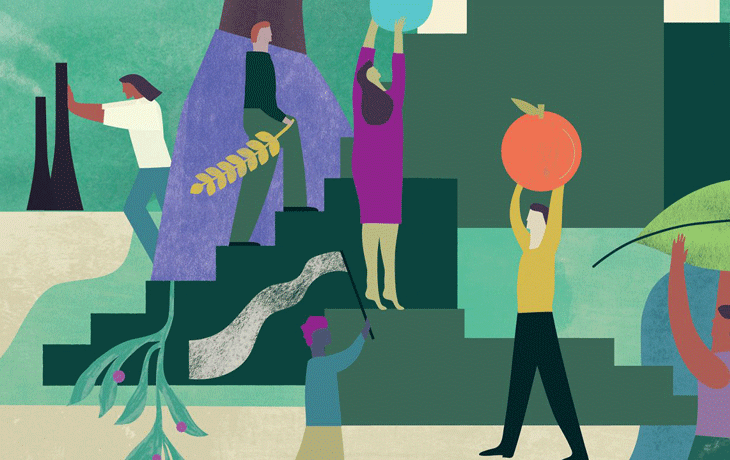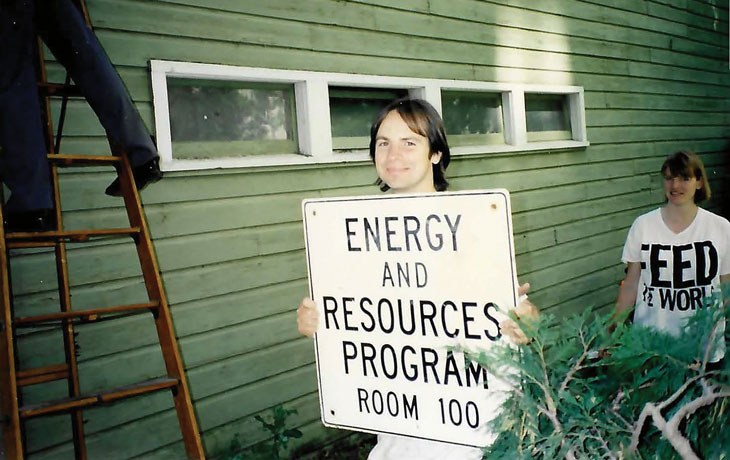Our fall issue of Breakthroughs highlights environmental justice researchers who are tackling the mounting inequities that are created or compounded by climate change, economic injustice, and the enduring legacies of racism.
Pioneers of interdisciplinary sustainability
The Energy and Resources Group celebrates 50 years of working toward a sustainable environment and a just society
Profile: A Bright Start
Alum Lee Chae utilizes AI to map and tap plant bioactive compounds that could potentially benefit human health.
Profile: The Fungal Detective
Former postdoctoral researcher Matthew Fisher traces the evolution of fungi across space and time to combat the diseases they drive.
Study links hurricanes to higher death rates long after storms pass
New research co-authored by ARE postdoctoral researcher Rachel Young reveals hurricanes and tropical storms in the United States cause a surge of deaths for nearly 15 years after a storm hits.
Evaluating Benefits of Electric Vehicle Subsidies under the Inflation Reduction Act
A study co-authored by Professor Joseph Shapiro shows that electric vehicle tax credits under the Inflation Reduction Act decreased climate pollution and benefited US vehicle manufacturers but have mixed benefits relative to taxpayer costs.
New center to advance use of seaweed in the global economy
Rausser College faculty John Coates, David Zilberman, and Alexandra Hill will co-lead the new International Bioeconomy Macroalgae Center at UC Berkeley, which has been granted nearly $13 million from the NSF and international partners.
Dennis Baldocchi to receive AGU Ambassador Award
Baldocci will receive the American Geophysical Union’s Ambassador Award in recognition of his contributions for scientific leadership to the Earth and Space community.
Conociendo nuestra cultura
This past summer, fourth-year environmental economics and policy student Magaly Santos studied abroad in Mexico City and Oaxaca, exploring sustainable agriculture and water management strategies as communities continue to adapt to climate change.
Small protected areas can have big impact for amphibians
As governments across the world work to expand protected areas in accordance with international agreements, the value of even the smallest protected areas can’t be discounted for their importance in conservation.
Advanced conductors provide path for grid expansion
A first-of-its-kind study led by UC Berkeley researchers found that the US could double its electric transmission capacity by 2035 by replacing electric lines with new material.
Rausser College student, alums named to 2024 Grist 50
ESPM graduate student Ryan Reed and alums Elsie Joshi and Sage Lenier were honored by Grist for their work solving climate problems in innovative and exciting ways.
How California's wildfire risk will reshape neighborhoods
Scott Stephens, a professor of fire science in ESPM, spoke to Bloomberg about new regulations that could transform the Berkeley Hills and neighborhoods across the state.
Ancient soils hold clues about the Atacama Desert
New analysis led by Professor Ronald Amundson determined that the Atacama Desert began drying out roughly 2 million years ago
The cost of controlling termites
Professors David Zilberman and Vernard Lewis and undergraduate Sadie Shoemaker break down the environmental and economic impact of termite fumigation.
UC Berkeley launches new center focused on environmental stewardship
Led by a team of experts in wildlife, data science, and parks and protected areas, the Stone Center for Environmental Stewardship is advancing nature conservation and restoration in the U.S. through community-engaged research, training, outreach, and policy.
Dangerous airborne fungus boosted by California droughts
A new study co-authored by Professor John Taylor identified seasonal patterns in Valley fever infections that could help public health officials prepare for future surges.
Dennis Baldocchi honored by American Meteorological Society
Baldocchi was named the 2025 Verner E. Suomi Technology Medal recipient for his significant technological contributions to atmospheric sciences.
Costa Rica’s rainforests offer a window—and warning
Professor Todd Dawson is part of a collaborative team studying how climate change could reshape forest ecosystems in Costa Rica and around the world.
A new discovery in Mono Lake
Professor Jill Banfield helped UC Berkeley researchers identify a choanoflagellate colony that hosts its own microbiome, something never before seen in these organisms.





















